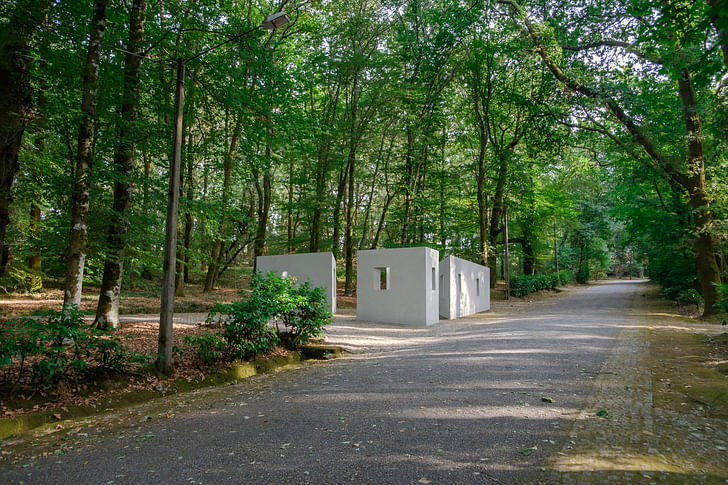

New Investigations in Collective Form, the newest monograph for The Open Workshop, is a timely book at a moment which feels short on time. Our best plans for combating the challenges facing the built environment will not come from the fixity nor the haste of any independent practice, but rather the meticulously thought up and drawn out plans of The Open Workshop and any other individuals willing to venture out into the collective.
Join us in celebrating New Investigations In Collective Form: The Open Workshop, the latest book by Neeraj Bhatia at Archinect Outpost on Friday, April 26, 7–9pm.
Keith Krumwiede will give a short introduction to kick off the event, followed by a panel conversation between Neeraj Bhatia, Noémie Despland-Lichtert and Jimenez Lai.
The book can be preordered here for pickup at the event, or shipping immediately after the event. Please go here to RSVP for the event.
How can a practicing architect today make sense of the present? While deep dives into political strife, environmental degradation and bureaucratic red tape are quintessential, there must also be the will to see beyond oneself as an individual, with an eye toward the collective public an architect is expected to serve. And after one has imbued their work with the weight of the world, there remains the obligation to provoke delight through design.
The conceptual projects and texts provided by The Open Workshop have provided lessons for the field, both for their open-endedness and their willingness to be shaped by its users.
Few architects today apply each of these principles as well as Neeraj Bhatia, the founder of The Open Workshop and associate professor at California College of the Arts. The conceptual projects and texts provided by The Open Workshop have provided lessons for the field, both for their open-endedness and their willingness to be shaped by its users. Needless to say, their unique ability to dive into the muck of contemporary politics and environmentalism and come out with an architecture that is plausibly optimistic makes their work a valuable reference for anyone fatigued by the difficulties of creative production.
The didacticism inherent in the work led to Actar and CCA Architecture Books' publication of New Investigations in Collective Form, a compilation of the firm's most significant projects and related essays. Its title is a homage to Investigations in Collective Form, an essay written by Fumihiko Maki's 55 years prior (1964) that provided the framework for an entirely novel method of producing urban design. As Bhatia explains in his essay in the book, "What Maki so eloquently pointed out was the need for the designer to now think simultaneously about dynamic cycles, time, and transformations, which he termed “the master program” and as well as how form (or in Maki’s terms, the “master form”) responded to these temporal scenarios."
Maki's writing influenced Bhatia to found a practice which focuses on "understanding how design can embrace the diversity and indeterminacy of the urban realm." The diversity among the writers that provided essay for the book are evidently the "collective" in collective form, beginning with a pithy argument by theorist Pier Vittorio Aureli, who argues that the lament against "form" in architecture is not only unfounded, but indeed the wrong way to reflect on architecture's role in the political realm. "The way in which architectural form naturalizes forms of (oppressive) power is visible in housing, parks, public buildings," Aureli argues, "all sort of constructions we now take for granted as inevitable paraphernalia of what we call the city." However, "for The Open Workshop, form is always collective because it is the reification of forces that exceed individual intention."
At a moment in history which feels short on time, New Investigations of Collective Form should inspire pause.
It is their intention to turn the field of architecture upside-down, in other words, so that it may productively redirect its attention towards "empower[ing] human and non-human subjects who have historically been overlooked by designers." Hence their fascination with the ‘open work,’ a term borrowed by the Italian writer Umberto Eco. To imagine a piece of architecture as an ‘open work’ would be to imbue it, according to Bhatia, with the "possibility of numerous subjective experiences and interventions while still maintaining its status as a “work” because it is framed within the world intended by the author."
The Garden of Framed Scenes, one of the most recent projects featured in the book, provides a clear demonstration of this productive tension between authorship and collective input. Sited at an intersection of Fontelo Park, The Open Workshop’s installation “transform[ed] a space of flow into a space of gathering” by framing key views of the surrounding landscape that “recontextualize the surrounding environment.” While visitors are encouraged to define their relationship to the installation - to transition between its voyeurs and performers as they please - the installation carries just enough authorship to encourage visitors to do so.
At a moment in history which feels short on time, New Investigations in Collective Form should inspire pause. Our best plans for combating the challenges facing the built environment will not come from the fixity nor the haste of any independent practice, but rather the meticulously thought up and drawn out plans of The Open Workshop and any other individuals willing to venture out into the collective.
Join us in celebrating New Investigations In Collective Form: The Open Workshop, the latest book by Neeraj Bhatia at Archinect Outpost on Friday, April 26, 7–9pm.
Keith Krumwiede will give a short introduction to kick off the event, followed by a panel conversation between Neeraj Bhatia, Noémie Despland-Lichtert and Jimenez Lai.
The book can be preordered here for pickup at the event, or shipping immediately after the event. Please go here to RSVP for the event.
No Comments
Block this user
Are you sure you want to block this user and hide all related comments throughout the site?
Archinect
This is your first comment on Archinect. Your comment will be visible once approved.